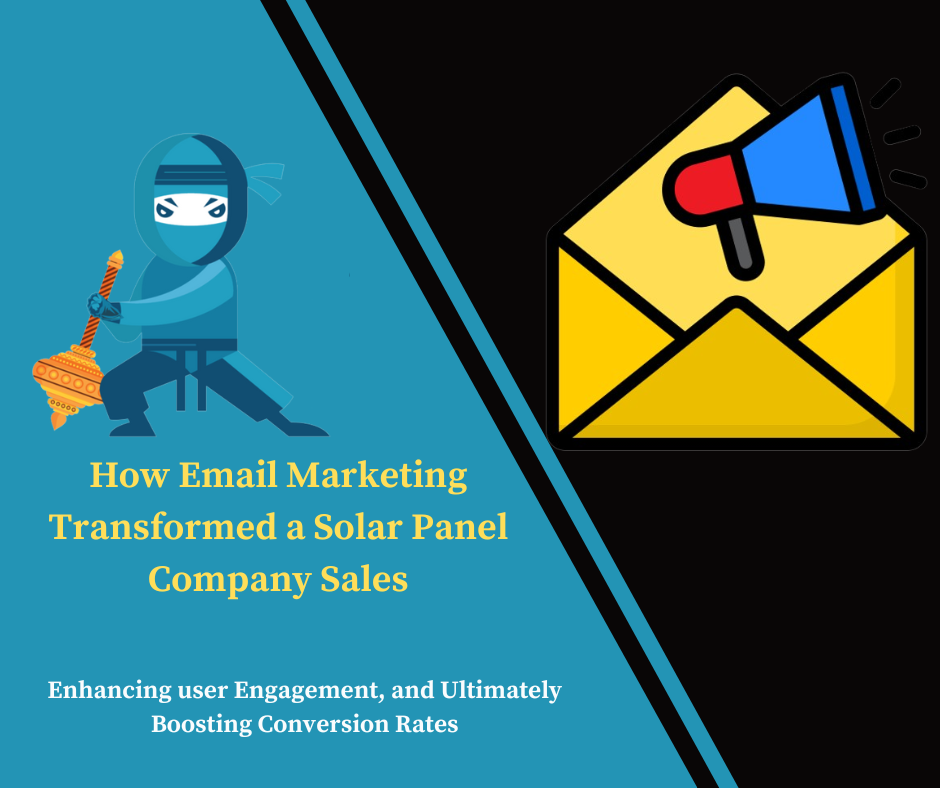How Email Marketing Transformed a Solar Panel Company’s Sales
Email marketing has long been a powerful tool for businesses across various industries, but its impact on niche sectors like the solar panel industry can be especially transformative. This article delves into how email marketing revitalized a solar panel company’s sales strategy, transforming its customer engagement and revenue generation.
The Solar Panel Industry Landscape
The solar panel industry has seen significant growth in recent years due to increasing awareness of climate change, advancements in technology, and favorable government policies. However, it’s also a highly competitive market with a diverse range of players, from large corporations to local installers. In such a crowded space, standing out and capturing potential customers’ attention can be a significant challenge.
The Challenge
One solar panel company, let’s call it SolarTech Innovations, faced a common issue: despite having a high-quality product and competitive pricing, they struggled to convert leads into actual sales. Their initial marketing efforts included traditional methods like print ads, trade shows, and a basic website, but these were not yielding the desired results. SolarTech Innovations needed a more effective strategy to engage potential customers and drive sales.
The Solution: Embracing Email Marketing
Recognizing the potential of email marketing, SolarTech Innovations decided to integrate it into its overall marketing strategy. Here’s how email marketing played a pivotal role in transforming their sales:
1. Building a Targeted Email List
The first step was to build a high-quality, targeted email list. SolarTech Innovations focused on gathering contacts from various sources:
Website Integration: SolarTech Innovations enhanced its website with strategically placed email sign-up forms. They offered valuable incentives, such as a free solar consultation or an informative eBook on solar energy benefits, to encourage sign-ups.
Event-Based Collection: They collected email addresses through webinars, trade shows, and local events, engaging attendees with relevant information about solar technology.
Partnerships and Referrals: Collaborating with complementary businesses and leveraging referrals helped them grow their email list with quality leads
2. Crafting Targeted and Personalized Content
Once they had a substantial email list, SolarTech Innovations focused on creating personalized and relevant content for their subscribers. This involved segmenting their email list based on factors like:
Customer Categories: They segmented their email list based on customer types (residential vs. commercial) and stages in the buying process (leads vs. existing customers).
Interest-Based Groups: By analyzing subscriber behavior and preferences, they tailored content to address specific interests, such as energy savings or technological advancements.
Also read: Turning Solar Leads into Customers: A Marketing Case Study
Content Types:
Educational Newsletters: Regular newsletters provided insights into solar technology, industry trends, and energy-saving tips.
Exclusive Offers and Promotions: Targeted emails with special offers, discounts, and limited-time promotions were sent to drive conversions.
Success Stories and Case Studies: Highlighting successful installations and customer testimonials built credibility and demonstrated the tangible benefits of their products.
3. Automating Campaigns
To streamline their efforts and ensure timely communication, SolarTech Innovations implemented email automation. This included:
Welcome Series: Automatically send a series of emails to new subscribers introducing them to the company, its products, and its value proposition.
Nurture Sequences: Developing a series of emails designed to educate and engage leads over time, guiding them through the sales funnel.
Follow-Up Reminders: Sending automated follow-ups to leads who had shown interest but hadn’t yet made a purchase.
4. Analyzing and Optimizing Performance
A crucial aspect of their email marketing strategy was continuous analysis and optimization. SolarTech Innovations tracked key metrics such as open rates, click-through rates, and conversion rates. They used this data to:
Refine Content: Adjusting email content based on what resonated most with their audience.
A/B Testing: Experiment with different subject lines, layouts, and calls to action to determine what drove the best results.
Feedback Loop: Gathering feedback from subscribers to understand their preferences and improve future campaigns.
The Results
The implementation of a robust email marketing strategy yielded impressive results for SolarTech Innovations:
Increased Engagement: Their email open rates and click-through rates saw a significant increase, indicating that their content was resonating with their audience.
Higher Conversion Rates: By nurturing leads through targeted email campaigns, SolarTech Innovations was able to convert a higher percentage of leads into paying customers.
Enhanced Customer Loyalty: Personalized communication and follow-up campaigns helped build stronger relationships with existing customers, leading to repeat business and referrals.
Revenue Growth: The combination of improved engagement, conversion rates, and customer retention resulted in a substantial increase in sales and revenue.
FAQ
What is email marketing?
Email marketing is a digital marketing strategy that involves sending emails to potential and existing customers to promote products, services, or content. It is used for various purposes, including lead generation, customer engagement, and retention.
How does email marketing benefit businesses?
Email marketing benefits businesses by providing a cost-effective way to reach a targeted audience, nurture leads, and build customer relationships. It allows for personalized communication, which can lead to higher engagement and conversion rates.
How can a solar panel company use email marketing effectively?
A solar panel company can use email marketing effectively by building a targeted email list, creating personalized content, automating campaigns, and continuously analyzing performance. This approach helps engage potential customers, nurture leads, and ultimately drive sales.
What types of emails should a solar panel company send?
A solar panel company should send various types of emails, including educational newsletters, exclusive offers, case studies, and automated follow-ups. Tailoring content to different customer segments can enhance relevance and effectiveness.
How can a company measure the success of its email marketing campaigns?
The success of email marketing campaigns can be measured using metrics such as open rates, click-through rates, conversion rates, and overall revenue generated. Analyzing these metrics helps businesses understand what works and where improvements can be made.
Conclusion
Email marketing has proven to be a game-changer for SolarTech Innovations, transforming their sales strategy and driving significant growth. By building a targeted email list, crafting personalized content, automating campaigns, and continuously optimizing their approach, they have achieved remarkable results. For businesses in the solar panel industry—and beyond—email marketing offers a powerful tool for engaging customers and driving sales.








